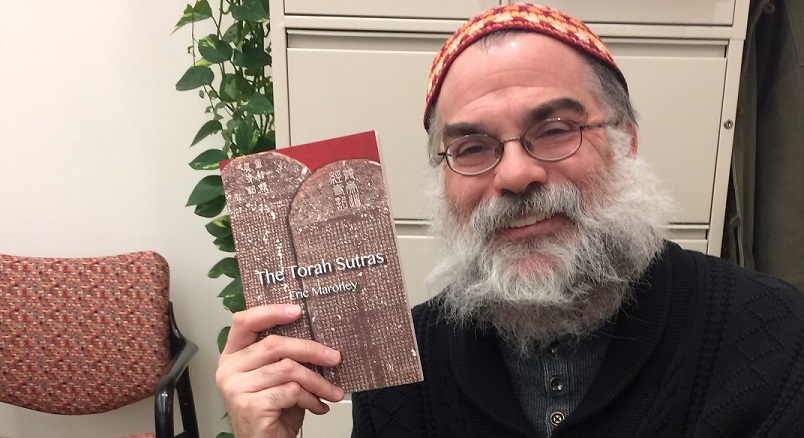Administrator finds success as novelist, writer, reviewer

Eric Maroney, graduate field assistant within the Department of Policy Analysis and Management, has spent nearly 20 years at Cornell in various administrative roles across the University. At the same time, he has moonlighted as an author of non-fiction and fiction literature, receiving commendation from his colleagues and peers alike.
Beginning his writings in his teen years, Maroney focused on personal journal entries. In his late 20s, his writing took a shift from the internal toward the external.
“When I started to consider writing as something for a wider audience, I began to look at the forms of writing I was producing, and how other people would read and react to them, and that opened up the idea of short fiction and longer works,” he said.
So far, Maroney has written two books of non-fiction, Religious Syncretism and The Other Zions, and also the recent, mixed genre book The Torah Sutras. His short fiction has appeared in over twenty literary journals and publications. Further, he is a regular fiction and non-fiction reviewer for the Colorado Review.
His most recent work, The Torah Sutras, offers an inspired mix of non-fiction, fiction, and poetry, presenting Judaism through a distinctly Chinese spiritual lens. A real community of Jews lived in China for almost a thousand years, but any writings of those Jewish communities have been lost, so this story fills in that space by imagining an account of Chinese "lost books" of the Torah.
Written as an English translation of these fictional Chinese writings, the Torah Sutras tells the story of the Exodus from Egypt with a Chinese voice, from the points of view of Moses, Aaron and Miriam. The book threads a careful line that reformulates some of Judaism’s primary assumptions by recasting them into Daoist, Buddhist, and Confucian forms.
“I usually write things that I would want to read,” Maroney said. “I ask myself what I want to read that is nowhere to be found. The Torah Sutras, which was just published, started with such a question. I wanted a fictional account of Judaism filtered through Chinese religion, and I couldn’t find one – so I wrote the book.”
According to Albion-Andalus Press, the publisher, the book is for “those who wish to stretch their spiritual muscles – to move beyond what they think they know of God and the Jewish religion and tradition, and move into new and unexpected territory.”
Building on the successful publication of this book, Maroney was also recently nominated for a 2019 Pushcart Prize for his short story “Sing,” published by The Tishman Review, a biannual journal of poetry, short fiction, creative nonfiction and art – a prestigious award that recognizes the best fiction published by small presses.
For Maroney, who admits writing is a solitary craft, the nomination strengthens his confidence and inspiration as a writer.
“I am not the first writer to say this, but writing can be a lonely endeavor,” he said. “We don’t sing or dance – people don’t watch writers perform on stage, and then applaud or boo. We rarely get that kind of feedback about our work. Rather, we write words on flat pieces of paper and send them out into what often feels like a void. So having the editors of The Tishman Review nominate my story “Sing” for a Pushcart Prize feels like suddenly someone has turned on the stage lights, and I’m hearing applause.”
On the Human Ecology front, Maroney was nominated in 2018 for the College of Human Ecology Staff Recognition Award. Within his recommendation letter, it was said he makes the Department of Policy Analysis and Management a better place to work on a day-to-day basis, routinely going above and beyond to exhibit commitment to the mission of Human Ecology.
According to one colleague in his nomination letter, Maroney “is a huge asset in keeping everything in the department’s Ph.D. program in the Graduate Field office running smoothly.”
Congratulations to Eric!